US Denies Allegations Of Syria Air Strikes
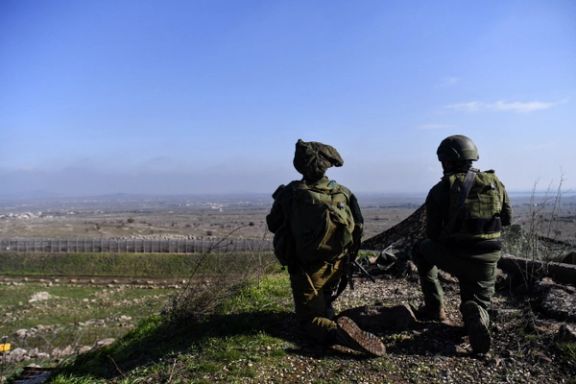
The United States refuted Iranian and Syrian claims of conducting dawn airstrikes in Syria after an attack which saw the deaths of seven soldiers and a Revolutionary Guards member.

The United States refuted Iranian and Syrian claims of conducting dawn airstrikes in Syria after an attack which saw the deaths of seven soldiers and a Revolutionary Guards member.
Syrian state news agency SANA blamed "US occupation aggression" for the attack while Pentagon spokesperson Sabrina Singh categorically stated the US "did not carry out airstrikes in Syria last night," addressing reporters in Washington.
Syrian state media said a civilian was also killed and at least 19 other soldiers and 13 civilians were wounded in strikes on residential areas and military sites in Deir al Zor province, with significant damage to public and private properties.
Iranian state media said a Revolutionary Guards adviser was killed in the airstrikes, without giving his rank.
Syria's Foreign Ministry condemned the strikes, alleging US actions mirrored Israeli aggression and aimed to destabilize the region.
Syria is a hub for Iranian militias which have a strong presence in Syria's eastern province of Deir el-Zour near the Iraqi border where Tehran has expanded its military presence. Iranian-backed forces in eastern Syria have also carried out numerous attacks on US facilities in the remote area.
Last month, US retaliatory strikes killed 29 pro-Iran fighters in the Deir el-Zour and Mayadeen areas after a deadly drone strike resulted in the death of three US troops in Jordan.
Iran claims its officers operate in Syria in an advisory capacity, having been invited by Damascus to aid President Bashar al-Assad in countering both internal and external threats. The support extends to the decade-long civil war, during which opposition forces unsuccessfully sought to overthrow Assad.
Israel too has conducted strikes against Iranian positions in the country in addition to the likes of ports and airports in a bid to stop the flow of weapons into the country from Iran, smuggling into proxies around the region.

US President Joe Biden faced criticism on Tuesday as the Hamas chief visited Tehran and praised Israel’s “political isolation” – just a day after the UN Security Council voted for a ceasefire Israel opposed.
The Biden administration abstained from using its veto power Monday as members of the UN’s most powerful body voted to demand an immediate ceasefire in Gaza. The decision enraged the Israeli government and its supporters in Washington, who felt their government had “betrayed” Israel and sided with Hamas.
That sentiment only intensified when the Hamas leader traveled to Iran in what some critics of Joe Biden called “a victory lap”. The red carpet was ceremoniously laid out to welcome him, a carefully choreographed spectacle aimed at unnerving adversaries and, crucially, to bolster the Islamic Republic's image as the unwavering defender of the Palestinian cause.
“Iran stands at the forefront of supporting the cause and people of Palestine,” Haniyeh said. “I extend special thanks to the Supreme Leader of the Islamic Revolution of Iran, the President of Iran, and the people of Iran.”
Critics of the Biden administration, predominantly from the Republican side, interpret this as the epitome of a failing foreign policy, particularly concerning the Middle East and the regime in Tehran.
“Biden's confused, contradictory policies regarding Israel's struggle against Hamas and Iran are dangerous,” former US national security advisor John Bolton wrote in the Hill. “America should flatly reject the concept of Hamas having a "terrorist veto" over Israel's right to self-defense. If we don't, Israel and our anti-terrorism efforts globally will be significantly weakened.”
The war in Gaza, and the US response to it, has become yet another wedge, widening and deepening the partisan divide in American politics. The unbridgeable rift places President Biden in an exceedingly challenging position, where any decision he makes is susceptible to criticism from both sides simultaneously.
“Today the Biden Admin betrayed Israel and sided w/ Iran-backed Hamas terrorists who continue to hold US hostages,” Senator Bill Hagerty (R-TN) commented on X. “The Admin is so desperate to appease the pro-Hamas left that it is willing to advocate against the interests of our ally & our own citizens still held hostage.”
This, naturally, is not how Democrats, particularly those labeled by Hagerty as the “pro-Hamas left,” perceive the situation or the President's role. In their eyes, Biden has not gone far enough in confronting the Israeli government and halting what nearly every international and aid organization has termed a humanitarian crisis.
“To pretend that Israel is not violating international law or interfering with US humanitarian aid is absurd on its face,” Senator Bernie Sanders (D-VT) said Tuesday after a spokesperson for the Department of State told reporters that there were no reasons to dispute Israeli assurances that it was complying with humanitarian law in Gaza.
“The state department’s position makes a mockery of US law and assurances provided to Congress,” Sanders continued.
Jeremy Konyndyk, a former senior Biden official who now heads Refugees International, also accused Washington of not doing enough to pressure Israel.
“You can't fight famine by half-measures, and that seems to be all the Biden administration can muster right now,” Konyndyk posted on X. “Until Biden is ready to impose real policy consequences on Netanyahu's government, the famine will continue.”
Given the fervor and intensity of stances on both sides of the aisle, make it difficult to anticipate the Biden administration's course of action in the days and weeks ahead.
The potential invasion of Rafah by Israeli forces threatens to escalate the already strained relationship between the US and Israel to its breaking point. US Vice President Kamala Harris recently called it a “huge mistake” that could have “consequences” for Israel.
These developments are viewed from Tehran with triumph and glee. The Iranian regime has no doubt increased its influence since the October 7th attack on Israel. Israel’s image, meanwhile, has been seriously challenged, if not tarnished. Meanwhile, the Islamic Revolutionary Guards (IRGC) and its armed proxy groups across the region have grown in cohesion and confidence.
Iran's Supreme Leader Ali Khamenei now likely wields greater leverage in managing relations with the US and regional adversaries, particularly concerning its domestic matters such as freedom and human rights – often considered secondary to regional security by global powers.
This new-found position has come at high price, albeit not for the Iranian regime.
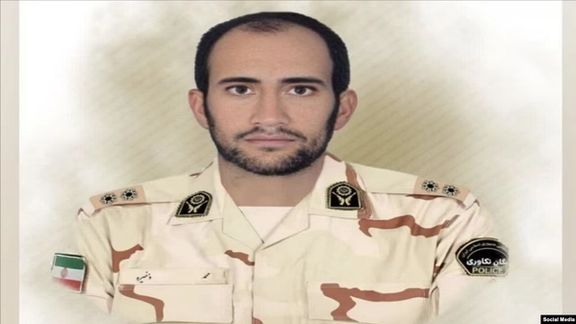
A confrontation between armed men and law enforcement forces along the route from Iranshahr to Khash in Sistan-Baluchestan province has led to casualties.
Among the victims are a one-year-old baby and a law enforcement officer, with three civilians sustaining injuries.
The Baluch Activists Campaign reported that armed men initiated gunfire at two law enforcement vehicles on Monday evening, resulting in the death of a law enforcement officer.
“In response, military forces retaliated by firing at the car of a Baluch citizen, resulting in the death of one-year-old Fatemeh Bameri and injuries to three others,” it added.
The Sistan-Baluchestan Law Enforcement Information Center presented the child's death as a consequence of armed men targeting her family's vehicle and identified the officer as Mohammad Zakhireh.
The incident adds to a concerning trend of increased armed attacks leading to deaths among regime forces in the largely Sunni province. Just a day prior, Iranian media reported the killing of border guard Mohammad Mehdi Nejatinia by unidentified assailants.
Furthermore, the event echoes past instances where innocent children have lost their lives due to direct fire from regime forces.
Kian Pirfalak, a nine-year-old child, was fatally shot by government forces during nationwide protests on November 16, 2022 highlighting the impact of such confrontations on civilian lives.

The US announced counter-terrorism sanctions targeting facilitators aiding Yemen's Houthis, Iran's Quds Force, and the Lebanese group Hezbollah.
With Iran's longstanding support, the Houthis have fortified their position in Yemen's decade-long civil conflict, seizing control over vast territories with extensive financial and military backing.
Most recently the group has imposed a blockade on one of the world’s primary sea trade and logistics routes. Multiple attacks have been carried out on global shipping including multiple deaths of seamen earlier this month.
The latest sanctions, imposed on six entities, one individual, and two tankers spanning Liberia, India, Vietnam, Lebanon, and Kuwait, aim to disrupt illicit commodity shipments and financial transactions, according to the US Treasury Department.
State Department spokesperson Matthew Miller said, "We will continue to use the tools at our disposal to target those who ship illicit cargo to benefit terrorist groups."
However, as Iran’s proxy activity continues, many in Washington say sanctions are failing, not least in deterring Iran’s nuclear program which has continued to grow beyond peaceful limits.
In a parallel move, the Treasury Department sanctioned 11 individuals and entities accused of bolstering Syrian President Bashar Al-Assad's regime through illicit financial transfers and drug trafficking.
Iran's extensive backing extends beyond the Houthis, encompassing several other designated terrorist organizations in the region including Hamas in Gaza which waged war on Israel in October 7.
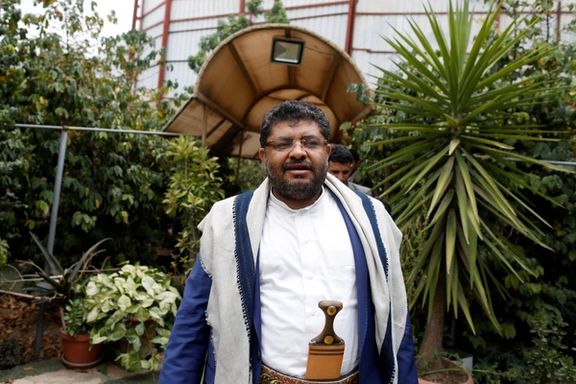
The Iran-backed Houthi terror group has renewed warnings against countries participating in attacks on its infrastructure amid US-led strikes against the group’s Red Sea blockade.
Mohammed Ali al-Houthi, a member of the group’s Supreme Political Council, issued the threats in an interview with Al-Masirah television channel, denouncing US pressure on other nations to join the 20-plus nation coalition against Yemen formed in response to its Red Sea blockade.
"We renew our warnings that any country that would act against our country would make its interests a legitimate target for us," al-Houthi stated, describing the US strikes as "arrogant" and "unjustified actions."
Al-Houthi also cautioned Saudi Arabia specifically against aiding the joint US-British aggression, warning that it would become a target for the rebel group which has been in a war with a Saudi-led coalition for almost a decade.
The Houthis have carried out dozens of missile and drone attacks on ships passing through the Red Sea, which they claim are linked to Israel. Recently, a Chinese-owned oil tanker was targeted, though no casualties were reported.
Despite the attacks, assurances were given to China and Russia that their ships would not be targeted, according to al-Houthi.
The US and UK have intensified strikes against Houthi positions to deter further attacks in the Red Sea, with recent strikes targeting underground storage facilities controlled by the rebels.
The blockade was launched in November on the orders of Iran’s supreme leader, in solidarity with terror group Hamas’s war against Israel, launched on October 7.
However, the blockade aiming to target Israeli linked vessels has since seen attacks on multiple international ships passing through the critical trade route.
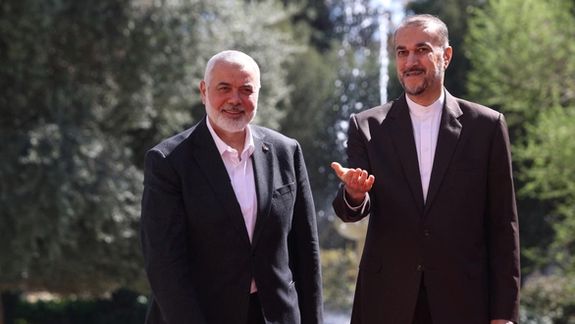
Hamas leader Ismail Haniyeh during his visit to Tehran met with Iran's Supreme Leader Ali Khamenei, who is a staunch supporter of Islamist groups among Palestinians and in regional countries.
"The Islamic Republic of Iran will not hesitate in supporting the cause of Palestine and the oppressed and resilient people of Gaza," Khamenei said during his meeting with Haniyeh.
The real reason for such trips rarely leaks to media, but Iran has backed Hamas in the nearly six-month war with Israel, which is still reeling from the US decision not to veto the UN Security Council resolution demanding an immediate ceasefire. This is Haniyeh's second visit to Iran since Hamas invaded Israel, killing 1,200 mostly civilians and taking 250 hostages in October.
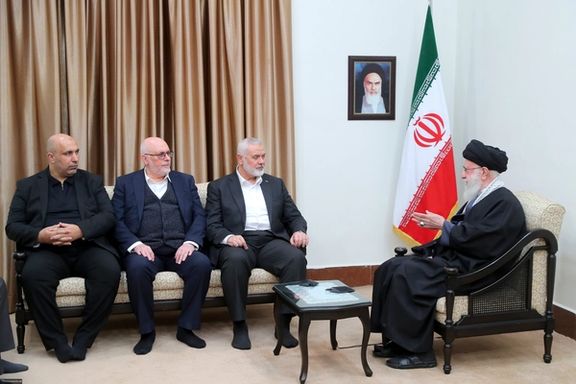
Hamas welcomed the resolution but said the ceasefire needs to be permanent. Iranian officials lauded it as “a positive step” with foreign ministry spokesman Nasser Kanaani saying, “A more important step is effective action for its implementation."
Haniyeh said in Tehran on Tuesday that Hamas is transitioning into a new phase of war with Israel. “We are in the process of passing through a historic phase in the struggle against the Zionist regime, with the Al-Aqsa Storm being the turning point,” he said during his joint press conference with Foreign Minister Hossein Amir-Abdollahian. Hamas dubs its attack on Israel as the Al-Aqsa Storm.
“Iran stands at the forefront of supporting the cause and people of Palestine,” Haniyeh added. “I extend special thanks to the Supreme Leader of the Islamic Revolution of Iran, the President of Iran, and the people of Iran.”
In March 2022, Haniyeh revealed that the Islamic Republic paid a total of $70 million to Hamas to help it develop missiles and defense systems. During an interview with Al-Jazeera, Haniyeh said different countries help in financing the group, but Iran is the biggest donor.
Last May, Iran International reported that Hamas pressured the Islamic Republic into inviting its leader, Ismail Haniyeh, to Tehran hoping to get financial support. Our sources said that although the Islamic Republic continues to provide financial aid to Hamas despite its own economic situation, Tehran was not satisfied with the performance of the group against Israel. This was only a few months before Hamas launched the October 7 attack.
While Hezbollah is by far Iran's richest and most powerful proxy, the combined funds of the Palestinian Islamic Jihad Movement, Hamas and the Popular Front for the Liberation of Palestine are enormous, Hamas and Islamic Jihad receiving a large share of Tehran’s aid. In 2018, US President Donald Trump’s special Middle East envoy Jason Greenblatt, who recently visited Israel's communities on the Gaza perimeter and toured the terror tunnel the IDF exploded, claimed Iran provided $100 million annually to Hamas compared to $700m annually to Hezbollah.
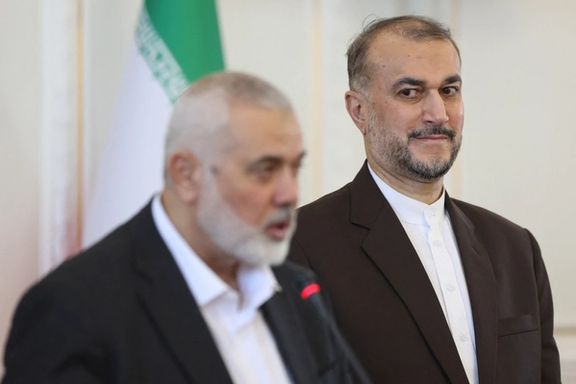
During his press conference in Tehran, Haniyeh stated that UN resolution was an indication that Israel is globally isolated. He said that Israel is "losing political cover and protection even in the Security Council" and "the US is unable to impose its will on the international community".
Also on Tuesday, Israel said it is recalling its negotiating team from Qatar after Hamas rejected its latest offer in talks for a hostage deal and truce.
According to Prime Minister Benjamin Netanyahu’s office, Hamas’s decision to reject a US-brokered compromise is “clear proof it is not interested in continuing talks, and a sad testament to the damage caused by the UN Security Council resolution.”
The Israeli government accuses Hamas of retreating to its “extreme demands” including a complete end to the war and full IDF withdrawal from Gaza. “Israel will not cave to Hamas’s delusional demands.”
A diplomatic official quoted by Hebrew-language media said Hamas demanded that Gazans be given carte blanche to return to the north of the Strip and did not even address a hostage release. “There is no one to talk to on the other side and the Israeli negotiating team has nothing to do in Qatar,” the source is quoted saying according to the Times of Israel.